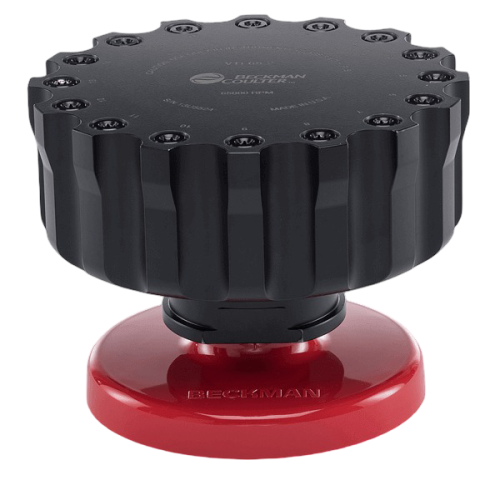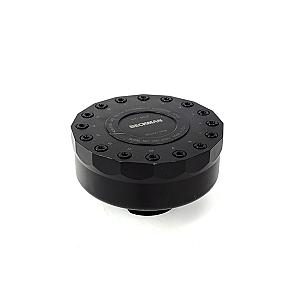The VTi 65.2 from Beckman Coulter is a high-performance vertical tube rotor designed for class H, R and S preparative ultracentrifuges. Capable of reaching a maximum speed of 65,000 rpm, it enables the precise separation of biomolecules on density gradients, including DNA and proteins. With a total capacity of 81.6 mL distributed over 16 tubes, its titanium design ensures robustness, reliability and corrosion resistance. Compatible exclusively with OptiSeal and Quick-Seal tubes, the rotor is optimised for maximum safety and exceptional efficiency in the laboratory.
VTi65.2 vertical tube rotor - Perfect Condition





Offer Details
Accessories :
Beckman Coulter Vti 65.2 Vertical-Tube Rotor 65.000 rpm 16 x 5.1 mL
Options :
7537
Description
VTi 65.2 vertical tube rotor: power and precision for biomolecular ultracentrifugation
The Beckman Coulter VTi 65.2 rotor is a precision instrument designed to meet the most stringent requirements for biomolecular separation inpreparative ultracentrifugation. Suitable for use in the brand's H, R and S class centrifuges, this vertical tube rotor can process up to 81.6 mL of samples distributed in 16 individual tubes, each inserted vertically to optimise force distribution and improve density gradient resolution. This type of configuration is particularly suitable for the separation of nucleic acids (such as plasmid or genomic DNA) and proteins on CsCl or sucrose gradients.
Made of titanium, a lightweight, robust and corrosion-resistant material, the VTi 65.2 has a black polyurethane paint finish and a reinforced safety system including a photoelectric overspeed disc. This device, installed at the base of the rotor, is detected by the ultracentrifuge to prevent the maximum permitted speed (65,000 rpm) from being exceeded. With a relative centrifugal force of up to 416,000 × g at maximum radius, this rotor is one of the most powerful in its class for protocols requiring extreme speeds.
Rotor preparation is simplified through the use of OptiSeal and Quick-Seal tubes, each requiring specific spacers depending on their type. OptiSeal tubes are closed by hydrostatic pressure and g-force, ensuring a tool-free seal, while Quick-Seal tubes are heat-sealed before centrifugation. These disposable tubes are single-use, minimising the risk of cross-contamination and optimising user safety, particularly when handling pathogenic samples.
In terms of operation, the VTi 65.2 requires a symmetrical tube arrangement with balanced filling to maintain rotor stability at high speeds. Each cavity used must be equipped with a spacer and a cap, screwed in place with a torque wrench to ensure a tight seal. The acceleration time to maximum speed is approximately 11 minutes, while deceleration takes 8 minutes, times that can be adjusted according to gradient stability requirements.
The VTi 65.2 thus embodies performance, reliability and safety, three fundamental pillars for demanding laboratories in molecular biology and biochemistry.
Features
- Compatible with Beckman Coulter class H, R, and S ultracentrifuges
- Exclusive use of disposable Quick-Seal or OptiSeal tubes
- Over-speed disc for automatic protection
- Balancing required with symmetrical filling
- Lubrication recommended with Spinkote for threads
- Compatible with CsCl gradients and other density solutions
- Programmable acceleration and deceleration for gradient stability
- Easy cleaning with dedicated kit
- Autoclavable (except Noryl parts)
- Store outside the instrument to prevent condensation
Technical Details
- Rotor type: vertical tube
- Maximum speed: 65,000 rpm
- Relative centrifugal force (RCF):
- At rmax (87.9 mm): 416,000 × g
- At rav (81.3 mm): 385,000 × g
- At rmin (74.7 mm): 353,000 × g
- k factor: 10
- Number of cavities: 16
- Capacity per tube: up to 5.1 mL
- Total capacity: 81.6 mL
- Maximum tube dimensions: 13 × 51 mm
- Acceleration time: 11 min
- Deceleration time: 8 min
- Weight when fully loaded: 8.5 kg
- Material: titanium
- Tube operating temperature: 2 to 25 °C
Compatible Accessories
- Rotor caps: ref. 368545
- Cap seals: ref. 342882
- Over-speed disc (65,000 RPM): ref. 330338
- Rotor screw: ref. 342705
- Torque wrench: ref. 858121
- Torx T40 adapter: ref. 976959
- Spinkote (lubricant): ref. 306812
- Cleaning kit: ref. 339558
- Solution 555 (detergent): ref. 339555
- Cleaning brushes: ref. 339379
- Extraction tools for floating tubes and Quick-Seal: ref. 338765 / 361668
- Quick-Seal Tube Topper (cordless): ref. 358312 to 358315 depending on region